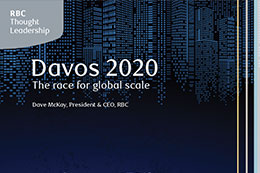RBC’s Dave McKay shares his 10 key takeaways from the World Economic Forum 50
When business leaders first met in Davos in 1971, their world was deeply divided, and it wasn't entirely clear capitalists would hold the day. The U.S. was losing to communists on the battlefield, socialism was winning in the streets, monetary policy was fighting for credibility, and young people were challenging the multinationals that had come to define global commerce.
Capitalism did win out, and for the vast majority of people, the world became a better place–more open, more educated, more innovative, and by most measures more prosperous. But at the 50th World Economic Forum in Davos last week, a new global divide became apparent. After a half-century of globalization, of rules and ambitions that carried the world through the end of the Cold War, the rise of the Internet, and the explosion of mobile computing, the world is facing new challenges, and new questions. And once again, a new generation is demanding action. Can capitalism again rise to the challenge?
This was my fifth trip to the Forum, and the first where I began to see the emergence of geopolitical systems and their economies as platforms competing for the transformation that lies ahead–and the deep implications that this holds. The 2020s may see a reordering of economies and industries, as societies respond to the threats of climate change and sectors tap the potential of smart technologies. But who defines that change remains to be seen. More than ever, business will have to step up.
Read the full article, available here, or download the report.


